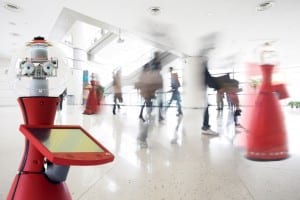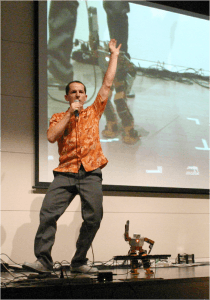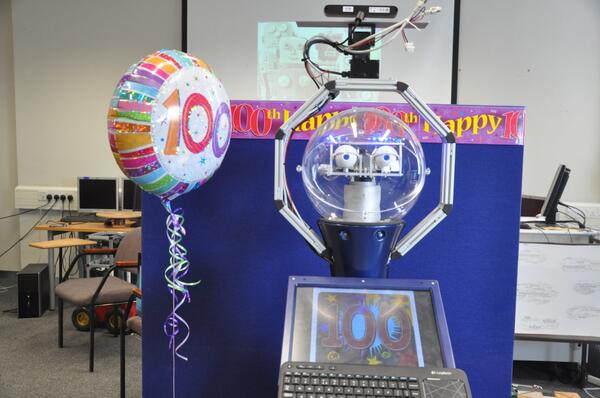L-CAS is offering another fully-funded PhD opportunity in the STRANDS project. 
Year: 2013
“Linda” participating in the EURobotics Week
Researchers of L-CAS are studying how mobile robots can learn from long-term experience to provide service in security and care scenarios. As part of the European STRANDS project, they contribute to the development of robots that are able to operate autonomously, without the need of human intervention, in regular indoor environments like offices and homes over long periods of time.
The 4 year project involving six academic partners from Lincoln, Birmingham, Leeds, Vienna, Aachen, and Stockholm has started in April this year. The EU robotics week is the project’s first major milestone to show their robots working continously and autonomously at the different sites. Lincoln’s robot “Linda” is patrolling its surrounding 24/7 during this week as part of the “STRANDS robot marathon”.
 Linda faces the challenge to safely and reliably navigate an environment that is populated by people and not customised to a robot’s needs. She will have to cope with changes that occur, such as lights being turned on and off, objects moved about, and people walking around. During the whole week Linda will be streaming live to the internet where the public can follow Linda on her patrol routes every day and night. Linda can be seen patrolling, charging autonomously, and visiting checkpoints that have been defined by the researchers. While this is the first step towards autonomous robots that can assist and help people, the STRANDS project ultimately aims to deploy robots like Linda to other sites where they will complement human guards to increase security and help staff in care facilities, facilitated by the project partners G4S and AAF, respectively.
Linda faces the challenge to safely and reliably navigate an environment that is populated by people and not customised to a robot’s needs. She will have to cope with changes that occur, such as lights being turned on and off, objects moved about, and people walking around. During the whole week Linda will be streaming live to the internet where the public can follow Linda on her patrol routes every day and night. Linda can be seen patrolling, charging autonomously, and visiting checkpoints that have been defined by the researchers. While this is the first step towards autonomous robots that can assist and help people, the STRANDS project ultimately aims to deploy robots like Linda to other sites where they will complement human guards to increase security and help staff in care facilities, facilitated by the project partners G4S and AAF, respectively.
Follow Linda live on the internet.
Research presentation on co-evolution of humans and machines by Paul Granjon
 You are kindly invited to the following research seminar which will take place on Friday, 29 November, 2-4pm at MC0024, MHT building.
You are kindly invited to the following research seminar which will take place on Friday, 29 November, 2-4pm at MC0024, MHT building.
Speaker: Paul Granjon, from Cardiff School of Art & Design, Cardiff Metropolitan University
Coy-B project and other robots for exploring the co-evolution of humans and machines
Paul Granjon is a performance and visual artist whose interest lies in the co-evolution of humans and machines, a subject he explores with self-made machines for live performance or exhibition. Granjon has produced since the late 1990s a collection of robots that include a set of Robotic Ears and Tail, several Automated Forests, a kicking automaton, a disco-dancing humanoid… His best-known creations to date are the Sexed Robots, a male and a female wheeled platforms that performed their cybernetic romance in the Welsh Pavilion at the Venice Biennale in 2005.
Motivated by a strong interest in the individual and social dynamics of techno-scientific progress, Granjon’s work provides a humorous yet critical comment on issues such as delegation to machines, digitisation of the social, technological body extension, sustainability, and also on the emergence of machinic life and the need for understanding the changing nature of contemporary artificial creatures. These two notions are at the core of Granjon’s ongoing Coy-B project.
A performance art experiment in human-machine interaction loosely based on Joseph Beuys’ performance I Like America and America Likes Me (1974) where the artist shared a gallery space with a wild coyote, the Coy-B project will be a performance for an advanced robot and a human in a shared territory. Diametrically opposed to the coyote who was a representative of instinct, a wild natural being, the Coy-B robot will represent wild machinic life. The performance aims to offer a platform for observing the relation between a human and an intelligent machines at a time when the boundaries between living and artificial are blurred.
The talk will feature examples of Granjon’s past work, references from art, science and technology, and a detailed presentation of the Coy-B project.
Paul Granjon’s website: www.zprod.org
Sebastian Wrede at Research Seminar
Everybody in Lincoln is invited to learn about some exciting research:
Venue: MB1015, Main Admin Building
Speaker: Dr. Sebastian Wrede, Cognitive Systems Engineering, CoR-Lab, Bielefeld University
Linda reaches milestone
Linda, L-CAS’s mobile robot developed in the STRANDS project, will soon be reaching a first major project milestone: Running autonomously for a total of 30 days. While this seems easy too achieve for today’s industrial robots, Linda has continuously been patrolling an office space at the School of Computer Science University of Lincoln which is not designed to accommodate a robot. The challenges Linda faced when she was on duty for 24/7 for a whole month were changing lighting conditions, re-arrangement of furniture, and blockage of her way. During this time Linda travelled more than a 100km.


And here is Linda’s tweet when she accomplished the milestone:

